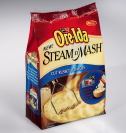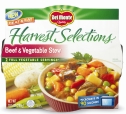Nearly 40% of consumers decide purchases in store
Plastic container bills passed by Calif. Senate
COOL ready to roll on Sept. 30
Mash-it-yourself potatoes steam in bag
Del Monte now serves lunch

by Pan Demetrakakes
Executive Editor
The investigation into the salmonella outbreak that has sickened more than 1,300 people is bogging down in recriminations, with the Food and Drug Administration (FDA) accused of incompetence and tomato growers demanding compensation for lost sales.
After months of blaming tomatoes, the FDA reversed course and fingered jalapeño peppers, based on a genetic footprint of a salmonella bacterium on a single pepper found in a Texas packing plant. Authorities traced that strain, known as Salmonella Saintpaul, back to a tank of irrigation water on a farm in Mexico.
But Mexican authorities said that the tank in question, located on a farm in the Mexican state of Tamaulipas, had not been used to irrigate crops in months, and that the U.S. “totally lacked scientific evidence” to say they had found the source of the contamination. To add to the confusion, the Centers for Disease Control, FDA’s partner in the investigation, refused to rule out tomatoes as the source as of Friday.
Meanwhile, furious tomato growers are demanding compensation for losses that they estimate at upwards of $200 million.
“We have been the primary injured party, and we look forward to Congress addressing that in the future,” Reginald Brown, the executive vice president of the Florida Tomato Growers Exchange, told a House subcommittee. Several Florida congressmen have already introduced bills authorizing $100 million in compensation for tomato growers and others.
For their part, some FDA officials claim that sloppy recordkeeping by small growers slowed their investigation. In any case, the incident has pointed up the need to overhaul food industry recordkeeping.
In 2003 and 2004, the food industry pressured the Bush administration not to expand paperwork showing the origin and distribution of produce. The administration also killed a proposal to require electronic recordkeeping.
“"If the FDA had been given the resources and authority years ago that it asked for to solve these kinds of problems, I think we would have solved this already," William Hubbard, a former FDA associate commissioner, told the Associated Press.
TOP DEVELOPMENTS
Nearly 40% of consumers decide purchases in storeWhile a widely accepted study from 1995 stated that consumers make 70% of their brand decisions in the store, a new study from OgilvyAction may prove otherwise. According to the new study, 39.4% of U.S. shoppers wait until they’re in the store to make purchase decisions, and 72.4% of shoppers only make one quarter of their major purchase decisions in the store. In addition, 20% will purchase brands they had no intention of purchasing, and 29% will leave behind a product they had planned to buy.
Plastic container bills passed by Calif. Senate
California’s state Senate has passed a bill to regulate food packaging, and will present another to the state Assembly (the lower house) in upcoming weeks. The first will require consumers to pay deposits on a range of plastic containers, from household goods to food, broadening the current law, which covers plastic beverage containers. Wine, distilled spirits and milk would continue to be exempt. The second bill seeks to ban the use of perfluorooctanoic acid (PFOA), deemed a “likely carcinogen” by federal investigators, in food packaging. While there is no evidence that the chemical is harmful to humans,DuPont Co., the sole U.S. manufacturer of PFOA, has accepted the EPA’s suggestion to eliminate use of PFOA by 2015. Both bills await action by the state Assembly, California’s lower house.
COOL ready to roll on Sept. 30
Much delayed country-of-origin labeling (COOL) is scheduled to kick in for a range of foods on Sept. 30, following action by the U.S. Department of Agriculture. The USDA issued an interim final rule that covers COOL requirements for most whole-muscle and ground meat, fresh and frozen vegetables and some nuts. COOL was legislated in 2002, but except for fish, was never instituted, due to heavy lobbying by the meat industry and others. But food-safety scares, many involving food originating outside the U.S., led to a groundswell of consumer support for the measure.

NEW PACKAGES
Mash-it-yourself potatoes steam in bagThe Ore-Ida unit of Heinz has come up with a significant advance on the steam-in-bag concept. Steam n’ Mash is frozen potato cubes that the consumer heats and softens by microwaving them inside their pouch, then mashes to the desired consistency. The stand-up pouch, converted byAlcan Packaging, is made from laminated film, printed in 10-color flexo reverse, with in-register laser venting to release steam at the proper rate. Flavors for the seven-serving bag include Cut Russet, Garlic Seasoned, Three Cheese and Sweet Potatoes.

Del Monte Foods is moving into complete shelf-stable meals with a line of shelf-stable stews and other one-dish lunches. The Harvest Selections line, positioned as healthy lunch alternatives for office or other workers, comes in rigid trays with lidding and paperboard sleeves. The single-serve product, whose varieties include Beef Stew, Italian Style Pasta Bake, Chicken Cacciatore, Homestyle Chili with Beans, Spinach and Cheese Ravioli and Santa-Fe Style Rice and Beans, all have at least a cup of vegetables.
